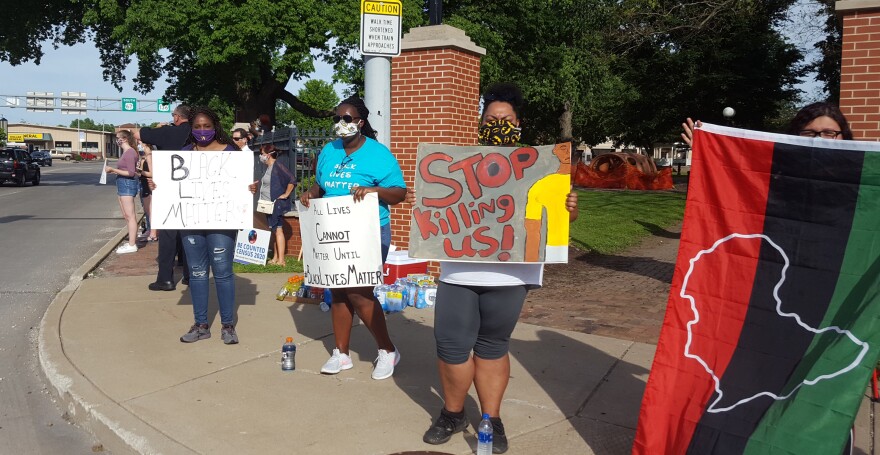This year's Juneteenth celebration in Macomb included another Black Lives Matter demonstration along the north end of Chandler Park. Food and beverages were also available as people gathered in the park for the late afternoon event.
Tri States Public Radio asked demonstrators what Juneteenth means to them:
Kali Shelton: I always celebrated July 4 until I moved here. Then we would always come up to Juneteenth when it was here and it was big with all the booths and stuff. I think last year was the first year I really asked “What is Juneteenth?” This year even more so and we’ve decided not to celebrate the Fourth of July because my kids would not have been free then. Juneteenth this year is me showing them that today is their Independence Day.
Emiliano Vera: Juneteenth means both a celebration of the legal fact that slavery was abolished but also demanding action because the legacy of slavery and the attacks on the humanity of black people continue.
Maya Lee: Juneteenth is about honoring and celebrating my ancestors and the work that they had to put in so that we could have our freedom today. I try to celebrate that by spreading education and awareness about what they had to fight for and how they had to push their radical legislation forward to call for abolition.
Ron Pettigrew: We’re honoring the people that died so that they could become free as well as the importance of remembering that freedom is not free. That it can be forgotten. That it can be taken for granted. It’s a time that we slow the process down to celebrate even if there is risk involved in that.
Merrill Cole: It means freedom. It’s an Independence Day that America should celebrate as a national holiday. It’s every bit as important as the Fourth of July and I’m really proud to be out here celebrating it.
Amy Carr: It’s a sign of the United States becoming what it ought to become.
Michael Kirby: I lived in Austin, Texas for 13 years and Juneteenth was a big deal there. I worked with an African American organization’s summer school program and I learned a lot about it then. I’m happy to see it becoming better known and hopefully a national celebration. It deserves to be so.
Samuel Richardson: Juneteenth is the celebration of freedom for African Americans in this country, something that they should have had from the start. They had to wait almost a century to be free, and they’re still free-ish, and that’s not right.
Brendon Richardson: We’re in solidarity with Black Lives Matter. We’re here, we’re clear, we’re saying Black Lives Matter. As a white man, I’m sick and tired of seeing my black brothers and sisters mistreated. It’s unacceptable. If there’s anything I can do as a white person to be out here and help and show my support and show my love for these people, that’s what I’m going to do. That’s the least I can do.
Marcial Anthony: Juneteenth is a concrete marker for when slavery by its regular name ended. It essentially shows that we made enough progress that they couldn’t be as overt with racism and white supremacy. From Juneteenth to Jim Crow to here we are now, we’re moving along. The fact that they have to modify their strategy as we’re fighting racism means that we’re doing something right.
This story was produced by Tri States Public Radio. TSPR relies on financial support from our readers and listeners in order to provide coverage of the issues that matter to west central Illinois, southeast Iowa, and northeast Missouri. As someone who values the content created by TSPR's news department please consider making a financial contribution.






